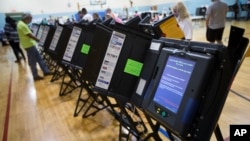On Tuesday, the largest grouping of states this year will hold primaries and caucuses in the U.S. presidential nominating contest, when voters in at least 11 states and one U.S. territory will cast their ballots.
Republicans are focusing on Southern states, which account for about two-thirds of the roughly 600 party delegates that will be awarded on the so-called Super Tuesday.
A national survey released Monday showed businessman Donald Trump, the front-runner in the Republican race, leading his closest competitor, Florida Senator Marco Rubio, 49 to 16 percent.
Democratic front-runner Hillary Clinton led her rival, Vermont Senator Bernie Sanders, 55 to 38 percent in the same survey.
Clinton is favored in most of the states voting Tuesday, but the Sanders campaign said it has a good shot at winning five of the states, especially his home state of Vermont.
More than 800 Democratic delegates are up for grabs Tuesday.
At a glance: Super Tuesday
Who votes? Primaries for Republican and Democratic voters are held in Alabama, Arkansas, Colorado, Georgia, Massachusetts, Minnesota, Oklahoma, Tennessee, Texas, Vermont and Virginia.
Caucus votes are held for Republicans in Alaska and Wyoming, and for Democrats in American Samoa, a U.S. territory.
Democrats living abroad also vote.
When do primary/caucus events end? South Dakota is the last state to vote, on June 7. The District of Columbia votes on June 14.
How many total delegates needed for party nomination? For the Democrats, that number is 2,383 delegates. For the Republicans, the number is 1,237 delegates.
Delegate count so far?
Republicans
Donald Trump, 81 delegates
Ted Cruz, 17
Marco Rubio, 17
John Kasich, 5
Jeb Bush, 3
Ben Carson, 3
Democrats
Hillary Clinton, 543
Bernie Sanders, 85






